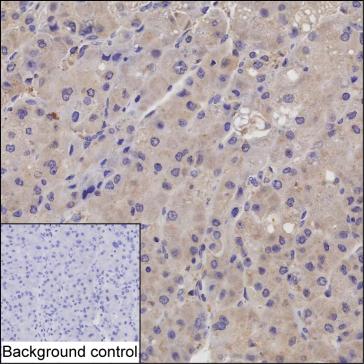
| WB | 咨询技术 | Human,Mouse,Rat |
| IF | 咨询技术 | Human,Mouse,Rat |
| IHC | 1/100-1/200 | Human,Mouse,Rat |
| ICC | 技术咨询 | Human,Mouse,Rat |
| FCM | 咨询技术 | Human,Mouse,Rat |
| Elisa | 咨询技术 | Human,Mouse,Rat |
| Host/Isotype | Mouse IgG2b |
| Antibody Type | Primary antibody |
| Storage | Store at 4°C short term. Aliquot and store at -20°C long term. Avoid freeze/thaw cycles. |
| Species Reactivity | Human |
| Immunogen | Purified recombinant fragment of human VASH2 |
| Formulation | Purified antibody in PBS with 0.05% sodium azide |
+ +
以下是关于VASH2抗体的3篇代表性文献及其摘要内容概要:
---
1. **文献名称**:*Vasohibin-2 modulates tumor progression in lymphatic metastasis via angiogenesis*
**作者**:Hosaka, T. et al.
**摘要**:该研究通过免疫组化和Western blot分析,发现VASH2抗体在检测肿瘤淋巴转移中的表达显著升高。实验表明,VASH2通过促进淋巴管新生加速肿瘤转移,抗体阻断可抑制这一过程,提示其作为潜在治疗靶点。
2. **文献名称**:*VASH2 regulates vascular sprouting by interacting with cytoskeletal proteins*
**作者**:Suzuki, Y. et al.
**摘要**:研究利用VASH2特异性抗体进行免疫荧光染色,揭示VASH2与微管结合蛋白的相互作用,调控血管内皮细胞的迁移和管腔形成。结果支持VASH2在发育和病理血管生成中的关键作用。
3. **文献名称**:*Therapeutic targeting of VASH2 in anti-angiogenic cancer therapy*
**作者**:Kerbel, R.S. et al.
**摘要**:综述性研究总结了VASH2抗体在临床前模型中的应用,包括抑制肿瘤血管异常化和增强化疗敏感性。作者强调VASH2抗体联合治疗在克服传统抗血管药物耐药性中的潜力。
---
以上文献涵盖了VASH2在肿瘤转移、血管生成机制及治疗策略中的研究,均涉及抗体的实验应用(如检测、阻断或靶向治疗)。如需具体文章细节,建议通过PubMed或学术数据库检索标题进一步验证。
The Vasohibin-2 (VASH2) antibody is a tool used to detect and study VASH2. a protein implicated in regulating angiogenesis and cell motility. VASH2. part of the vasohibin family alongside VASH1. is primarily expressed in endothelial cells and certain cancer cells. Unlike VASH1. which inhibits angiogenesis, VASH2 promotes neovascularization and tumor progression by enhancing endothelial cell migration and tube formation. It interacts with small vasohibin-binding protein (SVBP) to form a complex that exhibits tubulin detyrosination activity, influencing cytoskeletal dynamics and cellular processes like mitosis and metastasis.
VASH2 overexpression correlates with poor prognosis in cancers such as hepatocellular carcinoma, glioblastoma, and breast cancer, making it a potential therapeutic target. The antibody is widely used in techniques like Western blotting, immunohistochemistry, and immunofluorescence to analyze VASH2 expression, localization, and function in both physiological and pathological contexts. Research using VASH2 antibodies has highlighted its role in tumor microenvironment remodeling and resistance to anti-angiogenic therapies. Understanding VASH2's dual roles in vascular regulation and cancer progression remains critical for developing targeted treatments and biomarkers for angiogenesis-related diseases.
×